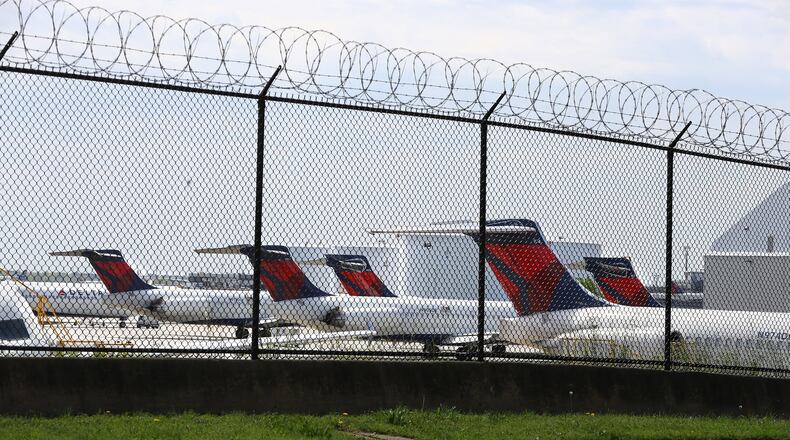Atlanta-based Delta Air Lines has reached an agreement for $5.4 billion in federal relief funding.
It’s among several deals Treasury Secretary Steven Mnuchin announced last Tuesday as part of $25 billion in rescue financing for passenger airlines amid plunging traffic due to the coronavirus pandemic.
On Monday April 20, the U.S. Treasury Department said it finalized agreements with Delta and several other airlines.
The funding conditions restrict airlines from cutting workers' pay rates or benefits or conducting involuntary furloughs through Sept. 30. They also require airlines to maintain a minimum level of flights for essential travel.
The federal help and Delta cost cuts “will prevent furloughs and pay rate reductions through the end of September, despite the 95 percent drop we’ve seen in passenger traffic,” Delta CEO Ed Bastian said in a memo to employees Tuesday evening.
The $5.4 billion for Delta, the dominant airline at Hartsfield-Jackson International Airport, includes a $1.6 billion unsecured, low-interest, 10-year loan. It also calls for Delta to provide the federal government with warrants to acquire about 1% of Delta stock at $24.39 per share over five years.
The stock warrants open the door to the government owning stakes in airlines. Mnuchin said the airline funding will support workers and “help preserve the strategic importance of the airline industry while allowing appropriate compensation to the taxpayers.”
Delta shares closed last Tuesday at $24.54, up 5.6% from Monday. Shares were up as much as 10% in after-hours trading Tuesday evening as news of the stimulus funding deals spread.
Mnuchin issued a statement saying Alaska, Allegiant, Delta, Frontier, Hawaiian, JetBlue, United, SkyWest and Southwest told the Treasury Department they plan to participate in the $25 billion payroll support program, part of the broader Coronavirus Aid, Relief, and Economic Security (CARES) Act approved by Congress last month and signed by the president.
“We look forward to working with the airlines to finalize the necessary agreements and disburse funds as quickly as possible,” said Mnuchin, who added that conversations continue with other airlines.
Although the stimulus funding is aimed at preserving jobs, industry watchers expect airlines will have to cut jobs after the funding and restrictions end.
Delta has already cut 80% of its flights and is parking at least half of its fleet because of the steep decline in travel. About 35,000 Delta employees have volunteered to take unpaid leave, and the company has reduced many employees' pay by 25% and cut hundreds of contractor jobs. Bastian said Delta has also raised $3 billion in cash, but still needs more employees to take unpaid leave.
Helane Becker, a Wall Street stock analyst with Cowen, told investors in a note Tuesday that airlines are expected to be 30% smaller at the end of this year compared with the beginning of 2020. She predicted it will take 3 to 5 years for domestic demand and 4 to 6 years for international demand to recover to 2019 levels.
The Air Line Pilots Association, a union that represents pilots at Delta and other airlines, said Treasury is “undermining the intent of the CARES Act by treating a portion of the grants designed to protect jobs not as grants, but as loans, which will make it harder to stop layoffs and slow the recovery.”
The union said it is still optimistic that more airlines will take the funding “and that Congress will seek to overturn the constraints placed on this worker assistance program.”
The CARES Act’s $29 billion in funding for airlines includes $25 billion for passenger carriers and $4 billion for cargo airlines. Sandy Springs-based package delivery giant UPS operates a major air cargo carrier. Another $3 billion is allocated for aviation contractors.
According to Mnuchin, the government plans to issue guidance for stimulus funding for cargo carriers and contractors “very soon.”
About the Author
Keep Reading
The Latest
Featured




